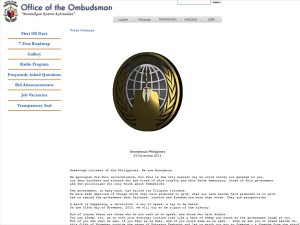
Defaced website of the office of the Ombudsman. Screengrab from https://www.ombudsman.gov.ph/index.php?home=1&pressId=NDAz
MANILA, Philippines—A group of hackers called “Anonymous Philippines” has defaced government websites several times in the last 14 months to express its opinion on sensitive issues in the country.
On Aug. 26, when thousands of people took part in the “Million People March” demanding the abolition of the pork barrel system, Anonymous Philippines hacked government websites. It joined the call for the scrapping of the pork barrel amid the P10-billion scam that channeled government funds to bogus nongovernment organizations.
According to the Department of Science and Technology, at least 30 government websites were defaced.
On its Facebook page, Anonymous Philippines claimed that the websites of the Office of the President, Senate, Bureau of Customs, Department of Finance, Department of the Interior and Local Government, Department of Agrarian Reform, Department of Public Works and Highways, Bureau of Internal Revenue, Bureau of the Treasury, Department of Energy, Department of Education and Department of Environment and Natural Resources were affected.
After the spate of webpage defacements, the Department of Science and Technology said there was a need for a secure Web hosting government agencies and services. It noted that a July 12 administrative order mandated state agencies and government-owned and -controlled corporations to host their websites under the new Government Web Hosting Service to be provided by the DOST.
Another hacking incident by Anonymous Philippines happened on March 14 when the group defaced the website of the Office of the President for “mishandling” the Sabah crisis caused by the revival of the sultanate of Sulu’s claim on Sabah.
The “hacktivists,” from the term hacktivism that fuses hacking and social activism, also struck on Jan. 15, the day for oral arguments in the Supreme Court for Republic Act No. 10175, or the CyberCrime Prevention Act of 2012, a law that protesters say threatens freedom of speech.
Websites of the Bureau of Customs and the television show “Eat Bulaga,” were defaced by hacker group Private X, a member of Anonymous Philippines. Also hacked was the website of the Quezon City Police District.
A day earlier, the group hit several government websites, including those of the National Food Authority, National Maritime Polytechnic, Cebu Port Authority and the municipality of Jose Panganiban (formerly Mambulao), to draw attention to the oral arguments at the high tribunal.
Anonymous Philippines left the same message on the Bureau of Customs home page as the one left on the other websites. The message read: “1987 Philippine Constitution. Article III, Section 4 states that ‘NO LAW SHALL BE PASSED ABRIDGING the freedom of speech, of expression, or of the press, or of the right of the people peaceably to assemble and petition the government for redress of grievances.”
It was not the first time that the group defaced government websites to draw attention to the controversial law, which a number of petitioners said may make it easier for authorities to spy on and/or harass citizens, especially critics, using electronic media.
In September last year, the websites of the Bangko Sentral ng Pilipinas, Metropolitan Waterworks and Sewerage System, the American Chamber of Commerce, the Philippine Anti-Piracy Team and Agusan del Sur were hacked by Anonymous Philippines as the cybercrime law took effect. Those of the Official Gazette, Senate and National Bureau of Investigation were either defaced or suffered denial-of-service attacks.
On Feb. 5 this year, the Supreme Court extended indefinitely its order suspending the implementation of the cybercrime law.—Inquirer Research
Sources: Inquirer Archives